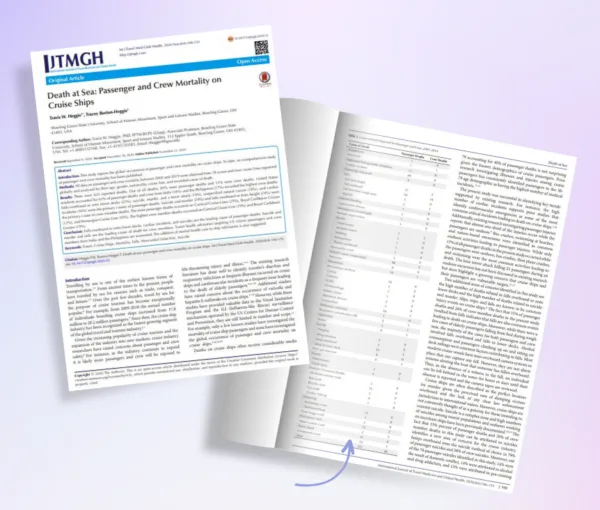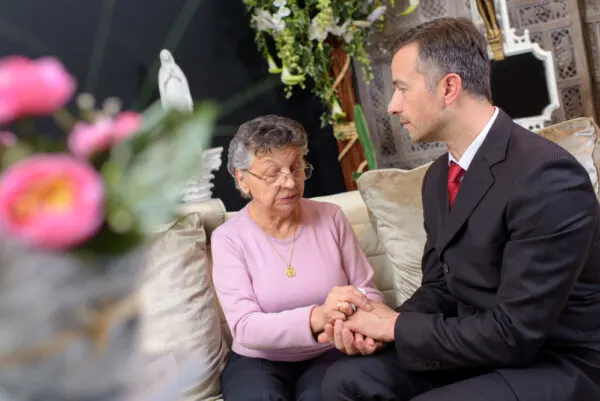Setting sail on a cruise vacation is an exciting experience filled with relaxation, entertainment, and exploration! As you’re planning, you probably wonder about the different amenities that may be on board, like water slides or a spa. But have you wondered, “Do cruise ships have morgues?” The answer is absolutely yes!
Around 200 people die on cruise ships annually, with most deaths caused by cardiac incidents. Ship morgues keep the deceased until an appropriate port, where they fly them home to their families.

Morgues form an important part of a cruise ship, allowing cruise lines to care for the deceased until the very end. Keep reading to learn more about how death is handled on the high seas.
Would You Find A Morgue On A Cruise Ship?
Sailing along on a cruise ship is one of the most fulfilling adventures you have on a vacation. The draw of the ocean can be mysterious and intriguing, but remember that it’s not exempt from accidents or crime. Falls from great heights, choking, drowning, suicide, and even murder are all incidents that can occur during your sea voyage. A morgue is necessary to transport the deceased back home.
The International Maritime Organization (IMO) and international regulations are the driving forces establishing the need for morgues on cruise ships. The IMO implements the standards for security and safety at sea (like the requirements for lifeboats). This goes hand-in-hand with emergencies and fatalities.
The morgue is in the lowest part of the cruise ship, along the I-95. It gets its name from the Interstate 95 highway running along the United States east coast. It’s a crew corridor that runs along almost the entire ship’s length, but it is not accessible to the passengers.
The crew can use the I-95 to access various cruise ship areas, like the engine control room, the laundry facilities, and their cabins. You’ll find everything stored there, from alcohol, food, and shipping equipment.
Why Do Cruise Ships Have Morgues?
Cruise ships are legally obligated to have a morgue because, on average, 200 people pass on cruise ships annually. The International Journal of Travel Medicine and Global Health (IJTMGH) conducted a study in 2020 that investigated the mortality rates of crew and passenger mortality on cruise ships.

They gathered data from 78 ocean cruise lines worldwide to analyze passenger and crew mortality from 2000 to 2019. During this period, a total of 623 deaths. Of these deaths, 89% were passengers, and 11% were crew members. Regarding passenger deaths, 61% were residents of the United States.
The incidental report shows:
- Falls overboard or onto lower decks (23%)
- Terror attacks, murders, and suicides (19%)
- Natural causes, unspecified (18%)
- Cardiac incidents (16%)
Falls include both accidental falls and intentional jumps, which could be suicides or homicides. Cardiac incidents only include deaths on board the ship and not those after being transferred to a hospital or a shore facility. Therefore, the actual number of cardiovascular deaths is higher than reported.
Most deaths on cruises are caused by cardiac-related issues, such as heart attacks. This is particularly common among older passengers, who make up a large populace among cruise ship travelers.
Many older individuals choose to embark on long-term cruise trips as they can be more affordable than living at home.
What Happens To The Bodies In A Cruise Ship Morgue?
Once a person passes away on a cruise ship, the cruise line will announce Operation Rising Star, which serves to notify the staff of the passing of a passenger. They place the deceased in a body bag and store them in the ship’s morgue until they can make arrangements to ship them back to their families. (While this is the standard procedure, sometimes things don’t proceed as planned.)
Operation Bright Star is a code some cruise lines use to alert the medical team that a passenger has an urgent medical emergency, such as a stroke, seizure, or heart attack.
These code names avoid panic among other passengers and crew members. Some cruise lines use different codes for medical emergencies, such as Star Code, Code Mike, or Code Blue.
Cruise ship morgues are big enough to accommodate three to four deceased, which varies between smaller and larger ships. When they need more space in the morgue, they also use freezers.
Once the necessary arrangements are in order, they have authorities issue a death certificate and return the deceased to their home country. The cost of returning the deceased falls to the family, but travel insurance usually covers these expenses.
To ensure a smooth process, they quickly unload the remains of the deceased through a separate exit from where passengers disembark.
In some cases, they keep the deceased on board, allowing the cruise ship to transport it back to the original port. This allows the deceased passenger’s companion to continue with their journey.

What Can You Expect When Facing A Death Onboard?
When a loved one passes, it’s tough, but thankfully cruise lines have services to make it easier for you. Here’s what you can expect:
- Contact the family – Onboard staff will use the emergency contact details provided by the passenger or ask fellow passengers traveling with the guest to inform you at home.
- Move the deceased – The cruise line will move the deceased to the morgue until the ship reaches an appropriate port.
- Bereavement services – You can expect an assigned Guest Care Team member to help you with emotional and logistical support. They will help with contacting local authorities, making travel arrangements, and dealing with insurance. You’ll have access to free internet and phone use onboard, and they’ll even drive you to a hotel if you choose to disembark the ship.
- Returning the deceased – The cruise line will repatriate the deceased to the person’s home country after obtaining a death certificate recognized by both countries. With the assistance of a repatriation service or funeral home, authorities fly the deceased home.
- Authorities conduct an investigation – Local authorities will investigate the cause of death, and the cruise line will cooperate to provide any relevant information or evidence.
- Reporting the death – The ship’s Flag State (i.e., where the ship is registered) and other relevant authorities will receive a report of the death. The cruise line will also do post-cruise follow-up with you.
Closing Thoughts
Onboard morgues on cruise ships are crucial for providing respectful care to the deceased until they can be transported home. So, the key takeaway is that cruise lines prioritize the safety and well-being of their passengers, even in death.

Tyler Bowman
Contributor
